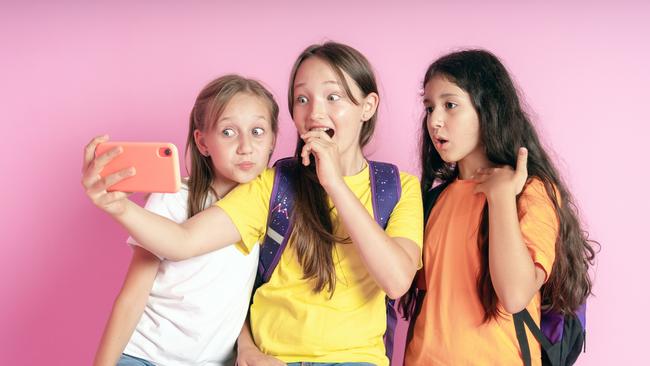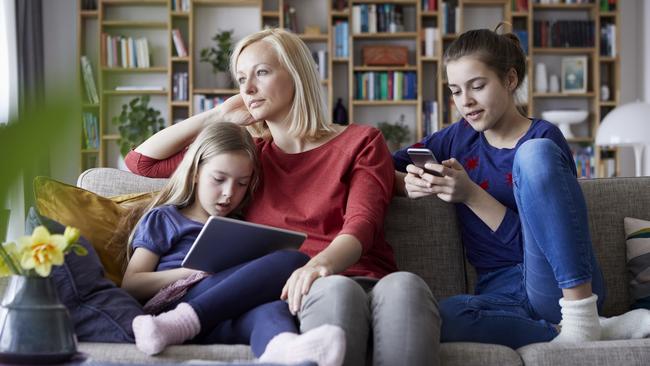We’re mad to give our children smartphones
Only by barring under-16s from social media can we break this toxic cycle of anxiety, addiction and mental ill-health.

We all know one: an inquisitive, bright-eyed ten-year-old who used to love stickers or novels and was always zooming around on her scooter. But she’s changed in the last few years. It started some time after the now-ubiquitous rite of passage, the iPhone unwrapped on her 11th birthday. Yes, with parental controls, but still stuffed with the most addictive, toxic, disturbing and pointless media known to man.
She became glued to her phone, obsessed with selfies, always browsing, “liking”, judging, fingers twitching with the tap-tap-tap of constant messages. The associated behaviour - the anxiety, stress, mood swings, perfectionism, depression - became part of everyday life. She had friends for whom it developed into an eating disorder, “gender dysphoria”, panic attacks and self-harm.
Now I’m sure that puberty has been ghastly in most times and places. But look what modern life has added into the mix: a device that never stops, not for sleep, food, work or play, which replaces normal social development with a compulsive stream of judgment by our peers, blended with any little thought or image or fantasy someone had, mediated by sparkling unicorns, gunfire, anatomy and confessions.
You don’t have to be a venerated psychologist to sense that adolescence has changed - worsened - since we unthinkingly unleashed smartphones, the opium of the modern age, upon the juvenile brain and then claimed, pathetically and disingenuously, that we are helpless to do anything about it. But since so many of us are ourselves enslaved to phone addictions and therefore resistant to the truth, I will lay it out.
Teen mental health is deteriorating across the developed world. The US Centers for Disease Control recently reported that 22 per cent of high school students have “seriously considered suicide”, up from 16 per cent in 2011. The trend is particularly bad for girls. In the same dataset, more than half reported feeling persistently sad or hopeless, versus about a third in 2011. This is global. Suicide rates for teenage girls in 17 developed countries, collated by The Economist, are up 40 per cent since 2014, a trend accelerated by Covid lockdowns. Forget teen vaping. This is the real youth epidemic of our times.
The data isn’t perfect yet, but it’s compelling enough that leading researchers, such as the American psychologists Jean Twenge and Jonathan Haidt, are sounding the alarm. Haidt points to studies suggesting the effect of social media on girls’ mental health is twice as bad as the effect of lead poisoning on IQ. Haidt, Twenge and others believe evidence of the causal link between teen smartphone use, especially social media, and mental health decline is now impossible to dismiss.

We know this from everyday experience. The apps on our smartphones trigger addictive dopamine brain patterns visible in imaging studies. They render us distracted, anxious and depressed. With overuse, they make it impossible for our brains to enter states that enable us to learn, have meaningful experiences and feed the human spirit, like concentration, flow, self-sufficiency, living in the moment and appreciation of what is before us, whether it’s a friend, Radiohead on stage or the sight of a horse chestnut blossom nodding in the breeze. For a developing brain pumped full of emotionally intensifying hormones, this rewiring is particularly powerful, perhaps even permanent.
It is high time the government took action, by which I do not mean passing the Online Safety Bill, an approach that is like putting a new filter in the opium pipe. The bill was born of the unbearably awful case of Molly Russell, a 14-year-old girl who took her life after consuming hours of self-harm content on Instagram. But while the bill will inflict huge damage on the free speech rights of adults, it will do nothing to tackle the broader problem, which is that kids spend too much time online.
What’s needed is a new regulatory regime. Personally, I would ban smartphone ownership for under-16s. An acceptable alternative could be something like a “tobacco-style regulatory framework”, called for by the campaign group Safe Screens. It would mean only licensed devices could be sold for child use and those devices must be stripped down, capable only of phone calls and approved apps such as maps. This would be much stricter and more effective than widely circumvented “parental controls”.

This has to be done by the state, because the situation presents a classic collective action problem. Parents who deny their teenage children phones risk socially isolating them from their peers, which can itself cause stress. Parents who regret succumbing to pressure feel helpless, afraid of dire consequences if they take the phone away. Parents like me, who have yet to reach the danger point, are hoping someone solves this before we too are sucked into the vortex. Even most of those parents who successfully limit screen time would admit that it’s a constant battle. And parents who don’t care? Well, their children are those who most need protecting.
As for the objections, they all smack of excuses. Yes, there are great educational and creative tools on the internet, but why do children need them in their pockets? It’s true, some schools have built smartphones into systems for homework; this is entirely unnecessary and should be reversed.
The truth, which we know in our guts, is that the harms conclusively outweigh the benefits. So why are we allowing this to go on? To what end? Either we act now or wait for our children’s brains to be rewired, for artificial intelligence and virtual reality to kick this into a whole new gear, when fixing it will become more painful and difficult.
If, on the other hand, we can haul our children out of this swamp, perhaps it will help us adults face up to it too and find a way to change our own habits. Of course smartphone technology has enormous benefits, but are we using it in a healthy way? Is it really a good idea to have constant, instant access to cameras, social media, messaging, porn, shopping, scrolling news and so on? Or should we be honest and admit that we, too, are living a little less, struggling to concentrate or be present, neglecting our souls and feeding our addiction a little too freely? Should we admit this may be contributing to some of those modern ills we deplore, such as short-termism, stress, tribalism, political extremism and all the rest? Or should we just wait for our children to grow up and look back at this age with wonder at how utterly, selfishly, foolishly cowardly we were? If, that is, they still retain the capacity for wonder.
THE TIMES



To join the conversation, please log in. Don't have an account? Register
Join the conversation, you are commenting as Logout